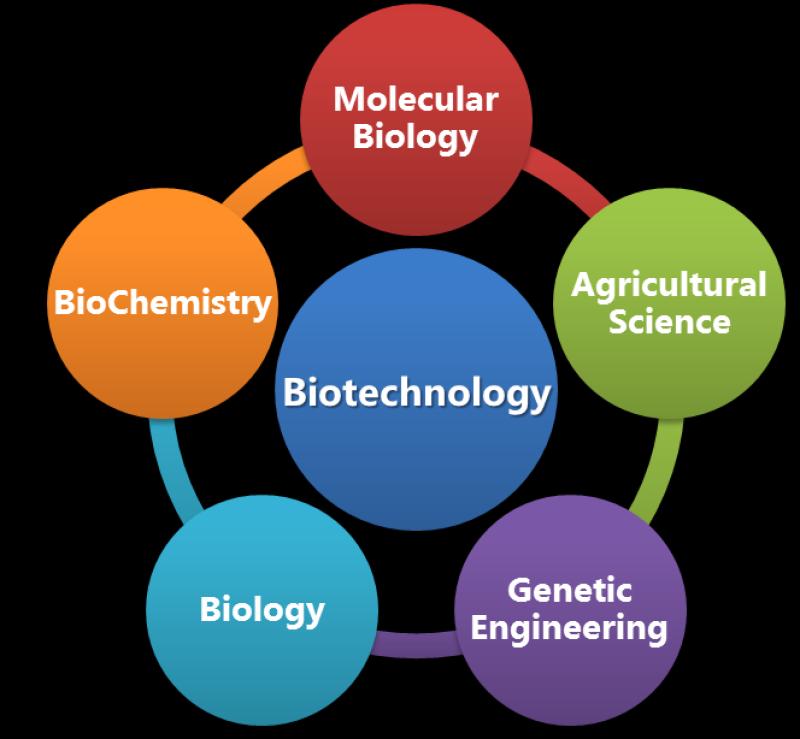What does it mean to study biotechnology?
Studying biotechnology involves exploring the scientific principles and techniques used to manipulate biological systems for practical applications. It is an interdisciplinary field that combines knowledge from biology, chemistry, genetics, and other related disciplines to develop innovative solutions and technologies. The academic focus of biotechnology encompasses a wide range of topics, and students pursuing studies in this field typically gain both theoretical knowledge and practical skills. Here are key aspects of what it means to study biotechnology:
Understanding Biological Systems:
- Students in biotechnology programs learn about the fundamental principles of biology, including the structure and function of cells, genetics, molecular biology, and biochemistry. This foundational knowledge forms the basis for understanding how biological systems work.
Genetic Engineering and Molecular Biology:
- Genetic engineering is a central aspect of biotechnology. Students study molecular biology techniques, including DNA manipulation, gene cloning, and recombinant DNA technology. This knowledge is crucial for applications such as the development of genetically modified organisms (GMOs) and the production of biopharmaceuticals.
Bioprocessing and Fermentation:
- Bioprocessing involves the use of living cells, microorganisms, or enzymes to produce desired products on an industrial scale. Students learn about fermentation processes, optimization of growth conditions, and the scale-up of biotechnological production.
Biopharmaceuticals and Medical Biotechnology:
- Medical biotechnology focuses on the application of biotechnological principles to healthcare. Students explore the development of biopharmaceuticals, gene therapies, and diagnostic tools. They may also study topics like stem cell research and tissue engineering.
Bioinformatics and Computational Biology:
- Bioinformatics involves the use of computational tools and techniques to analyze biological data. Students in biotechnology programs may learn how to use bioinformatics tools for genomics, proteomics, and systems biology analyses.
Environmental Biotechnology:
- Environmental biotechnology addresses the use of biological processes to solve environmental challenges. Students study topics such as bioremediation, waste treatment, and the development of sustainable practices to mitigate environmental impact.
Ethics and Regulatory Aspects:
- Given the potential societal impacts of biotechnological applications, students often explore ethical considerations and regulatory frameworks. This includes discussions on responsible conduct in research, biosafety, and the ethical implications of genetic engineering.
Hands-On Laboratory Skills:
- Practical skills are a significant component of biotechnology education. Students gain hands-on experience in laboratory techniques, including pipetting, DNA extraction, polymerase chain reaction (PCR), gel electrophoresis, and more.
Industry Internships and Collaborations:
- Many biotechnology programs emphasize practical experience through internships or collaborations with industry partners. This exposure to real-world applications enhances students' readiness for careers in biotechnology.
Research Opportunities:
- Biotechnology programs may provide opportunities for students to engage in research projects. This could involve working on cutting-edge projects in areas like genetic research, drug development, or bioprocessing optimization.
Communication Skills:
- Effective communication is crucial in the field of biotechnology. Students learn to communicate scientific findings through written reports, presentations, and other forms of scientific communication.
Studying biotechnology prepares individuals for careers in various sectors, including pharmaceuticals, agriculture, healthcare, and environmental management. Graduates may work in research and development, quality control, regulatory affairs, or production within the biotechnology industry. Additionally, some individuals pursue advanced degrees for further specialization or engage in entrepreneurship to bring innovative biotechnological solutions to the market.
Studying biotechnology involves a comprehensive approach that integrates various scientific disciplines to understand and manipulate living organisms for diverse applications. It encompasses a broad range of subjects, including:
Molecular Biology: The study of the molecular structure and function of genes, DNA, RNA, and proteins, which form the basis of life processes.
Biochemistry: The study of the chemical processes that occur in living organisms, including metabolism, enzyme catalysis, and energy production.
Genetics: The study of heredity and variation in living organisms, including gene transmission, gene expression, and genetic engineering techniques.
Cell Biology: The study of the structure, function, and behavior of cells, the fundamental units of life.
Microbiology: The study of microorganisms, microscopic organisms such as bacteria, fungi, viruses, and protozoa, and their role in various biological processes.
Bioinformatics: The application of computer science and information technology to analyze and manage biological data, including genomic sequences, protein structures, and gene expression profiles.
Bioprocess Engineering: The design and optimization of biological processes for industrial applications, such as fermentation, biofuel production, and pharmaceutical manufacturing.
Biomedical Engineering: The application of engineering principles to solve medical problems, including the development of prosthetics, implants, and medical devices.
Agricultural Biotechnology: The application of biotechnology to improve agricultural practices, including crop breeding, pest resistance, and enhanced nutritional value of food crops.
Environmental Biotechnology: The application of biotechnology to address environmental challenges, such as bioremediation, wastewater treatment, and biodegradation of pollutants.
Studying biotechnology requires a strong foundation in science, mathematics, and problem-solving skills. It also involves hands-on laboratory experience to gain practical skills in techniques such as DNA manipulation, protein purification, and cell culture.
Biotechnology is a dynamic and rapidly evolving field, and new discoveries and applications are constantly emerging. As a result, biotechnology graduates are in high demand across various industries, including healthcare, agriculture, pharmaceuticals, environmental protection, and biomanufacturing.












